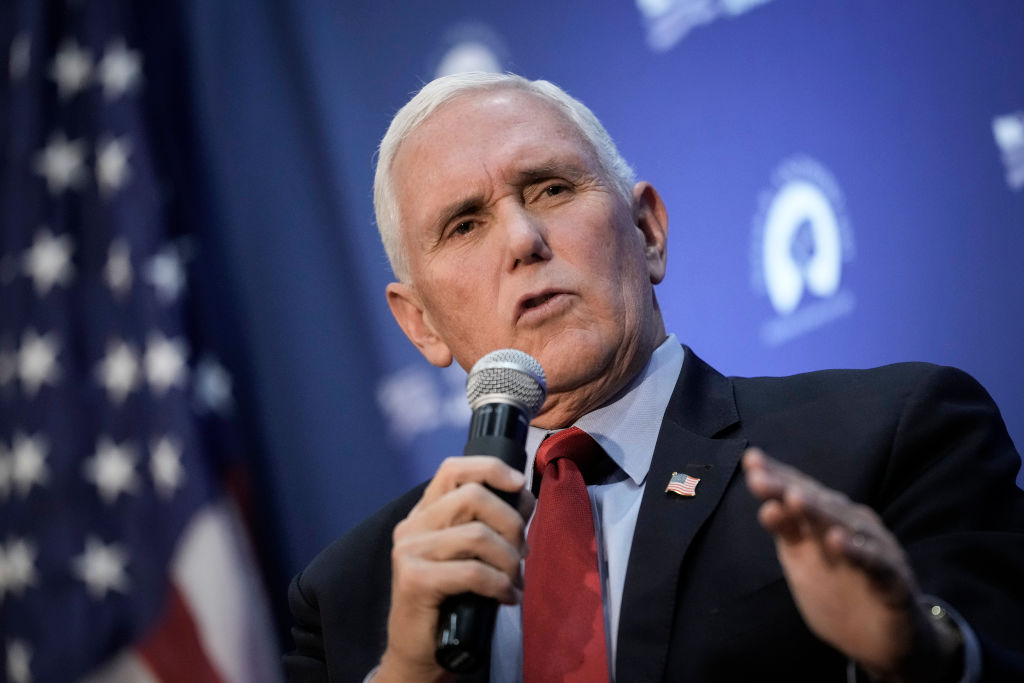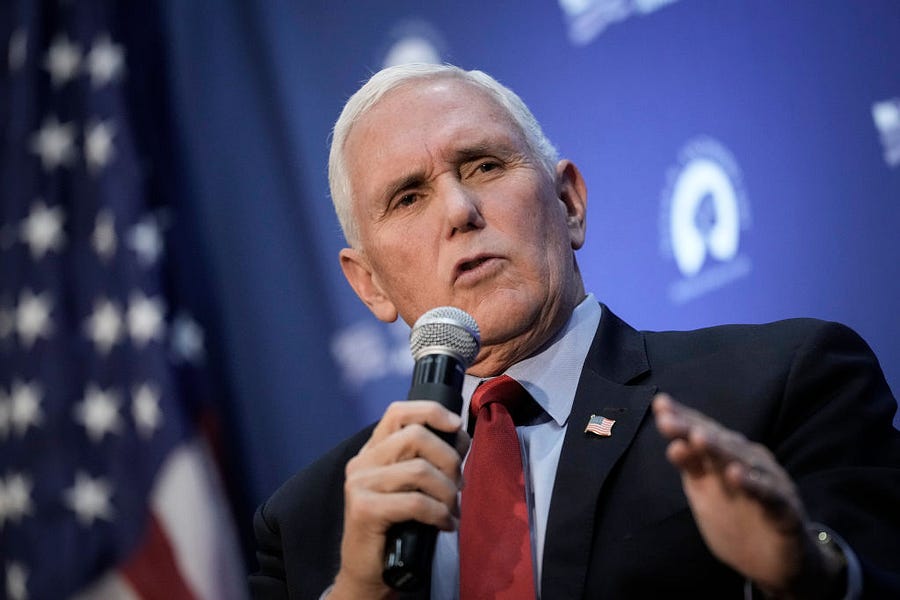Happy Monday! On this day in 1964, the Beatles arrived in America for the first time. There was so, so, so much screaming.
Quick Hits: Today’s Top Stories
-
U.S. employment growth dramatically exceeded expectations in January, with the Bureau of Labor Statistics reporting Friday that American employers added 467,000 jobs last month. The unemployment rate ticked up to 4 percent from 3.9 percent in December, and average hourly earnings have increased 5.7 percent year-over-year.
-
Senior Biden administration officials reportedly told members of Congress last week the administration believes Russia has amassed along its border approximately 70 percent of the forces necessary to launch a full invasion of Ukraine. The officials do not believe Russian President Vladimir Putin has made a final decision on whether to invade, but said that if he does, it will likely be in the second half of February and could result in tens of thousands of deaths. Ukrainian Foreign Minister Dmytro Kuleba, meanwhile, cautioned on Sunday against believing “apocalyptic predictions,” maintaining Ukraine is “ready for any development.”
-
The House voted 222-210 on Friday to pass the America COMPETES Act, legislation aimed at bolstering the United States’ economic competitiveness vis-a-vis China. Although Friday’s vote was almost entirely along party lines after Republicans objected to the inclusion of what they saw as partisan “poison pills,” a similar bill received nearly 20 Republican votes in the Senate last year. The two chambers will seek to hammer out their differences in the coming weeks.
-
The Wall Street Journal reported Friday that, per data released by the Biden administration in a court filing, U.S. Border Patrol agents made a record-high 1.9 million arrests along the southern border with Mexico in 2021. Approximately 20 percent of the apprehended migrants were released into the United States while their asylum claims are processed, down from 56 percent of apprehended migrants during a pre-pandemic surge.
-
President Joe Biden announced on Friday he will extend through 2026 most of the Section 201 tariffs former President Donald Trump placed on imported solar panels and solar cells in 2018, but allow for many more products to be exempted from the levies.
-
Gas prices in the United States hit a seven-year high on Friday, with Americans paying an average of nearly $3.45 per gallon for the first time since late `2014.
-
Hundreds of people protested in Minneapolis over the weekend after a Minneapolis police officer shot and killed 22-year-old Amir Locke in a no-knock raid last week. Released body cam footage shows officers unlocking an apartment door with a key and shooting Locke—who was not the target of the investigation, but was sleeping on a couch and holding a gun—within seconds. Minneapolis Mayor Jacob Frey on Friday imposed a moratorium on no-knock warrants.
An Awkward Weekend for the GOP

In seeking to understand the past decade of Republican politics, it’s useful to think of a Venn diagram. The GOP as currently constructed is not really one party, but multiple coalitions—for for simplicity’s sake, let’s say two (but there are more)—bound together by a set of shared ideals and opposition to the left.
For much of former President Donald Trump’s time in office, Republican elected officials in both the traditional conservative camp and populist camp agreed to hang out primarily in the middle of the Venn diagram—confirming originalist judges, cutting taxes, etc. Sure, each side spent some time in their respective poles—the party was deeply divided on trade policy and immigration, for example—but, after making their peace with Trump’s presidency in 2016, Republicans generally sought over the next four years to focus on the areas where they could find agreement. As the old saying widely attributed to Ronald Reagan goes, “The person who agrees with you 80 percent of the time is a friend and an ally, not a 20 percent traitor.”
But the legitimacy of the democratic process is a heck of a 20 percent to disagree about, which partially explains why, in the wake of January 6 and all that led up to it, the GOP has taken Reagan’s adage and turned it on its head. The middle of the Venn diagram is empty, with each of the GOP’s factions retreating to their corners.
“The Republican National Committee hereby formally censures Representatives Liz Cheney of Wyoming and Adam Kinzinger of Illinois and shall immediately cease any and all support of them as members of the Republican Party.”
Such a move has been in the works for weeks—and originally included language calling for the expulsion of Cheney and Kinzinger from the House Republican Conference—but RNC members finalized the resolution and voted to pass it at their winter meeting in Salt Lake City last week. Cheney and Kinzinger’s transgressions? Supporting Democratic efforts to “destroy President Trump” more than they support “winning back a Republican majority in 2022,” and “participating in a Democrat-led persecution of ordinary citizens engaged in legitimate political discourse.”
After the language of the censure resolution was made public, GOP Chairwoman Ronna McDaniel quickly sought to clarify that the RNC viewed stolen election claims and efforts to overturn said election as “legitimate political discourse,” not the violence at the Capitol. But the message came through loud and clear: Any effort to draw attention to January 6 rather than sweep it under the rug is not welcome at the Republican National Committee.
We say Republican National Committee and not Republican Party because, although the two are often closely aligned, the RNC’s leadership was more or less installed by Trump, as were many of its voting members—state party chairs, committeemen, committeewomen, and the like. “[The RNC is] certainly representative of the GOP infrastructure, the activist base of the party,” said Doug Heye, a political operative who served as the RNC’s communications director during the Obama years. “That may not be reflective of the broader party, of voters who are voting either in primary elections or in general elections.”
That’s not to say Cheney and Kinzinger, who serve on the January 6 Select Committee, are overwhelmingly popular among GOP voters—they’re not. All signs point toward Cheney losing to a Trump-backed primary challenger later this year, and Kinzinger announced last October he isn’t running for reelection. “There is a reason why Adam is quitting,” Minority Leader Kevin McCarthy said Friday. “There’s a reason why Liz Cheney is no longer in leadership and has [a] very low poll rating in Wyoming.”
But Republican opinion on January 6—and Trump more broadly—is less monolithic than the RNC’s antics would lead you to believe. A survey conducted a few weeks ago by Echelon Insights, a GOP polling firm, found that 40 percent of Republican voters believe it’s time to move on from the former president, and 30 percent of GOP voters (with 11 percent undecided) would support a conservative who “didn’t agree with Donald Trump’s actions following the 2020 election and on January 6” over Trump himself in a hypothetical 2024 primary. Thirty percent is still a minority, of course, but a lot can change in two years—and members of that 30 percent are disproportionately represented in the halls of Congress, particularly the Senate.
“The RNC is censuring Liz Cheney and Adam Kinzinger because they are trying to find out what happened on January 6th,” Sen. Bill Cassidy of Louisiana tweeted. “HUH?”
“Shame falls on a party that would censure persons of conscience, who seek truth in the face of vitriol,” Sen. Mitt Romney added on Friday. “Honor attaches to Liz Cheney and Adam Kinzinger for seeking truth even when doing so comes at great personal cost.”
Cassidy, Romney, and Sen. Lisa Murkowski are not new to this position, of course—all three voted to convict Trump a year ago this month—but they were joined over the weekend by a chorus of less expected voices. Rep. Michael McCaul of Texas told ABC News on Sunday the truth about January 6 “needs to come out” even if House Speaker Nancy Pelosi is “weaponiz[ing]” it to Democrats’ political advantage. Gov. Chris Christie—one of Trump’s earliest supporters who cut bait last year—accused McDaniel of “carrying water” for the former president.
“All anybody is talking about this weekend is this resolution rather than talking about the failures of the Biden administration,” Christie said. “People are tired of hearing about the 2020 election from Donald Trump and from some who support him.”
But the biggest surprise of the weekend came during a Federalist Society conference in Florida. “I heard this week that President Trump said I had the right to overturn the election,” former Vice President Mike Pence said in a speech on Friday. “President Trump is wrong. I had no right to overturn the election. The presidency belongs to the American people, and the American people alone.”
“Frankly, there is no idea more un-American than the notion that any one person could choose the American president,” Pence continued. “There’s more at stake than our party or political fortunes. Men and women, if we lose faith in the Constitution, we won’t just lose elections. We’ll lose our country.”
The former Indiana governor expressed many of the same sentiments in a speech delivered at the Ronald Reagan Presidential Library last summer, but Friday was the first time he directly called out his two-time running mate. Trump noticed, blasting out an emailed statement Friday night calling Pence “an automatic conveyor belt for the Old Crow Mitch McConnell to get Biden elected President as quickly as possible” and claiming, incorrectly, that ongoing bipartisan efforts to update the Electoral Count Act show that he “was right [about what Pence could’ve done] and everyone knows it.” In an interview with ABC News’ Jonathan Karl last March, Trump dismissed January 6’s “Hang Mike Pence!” chants as people being “very angry” about the vice president passing on a “fraudulent vote” to Congress.
Marc Short—Pence’s former chief of staff, who wouldn’t speak on these issues without at least some coordination with his old boss—said on Meet the Press yesterday the former vice president called Trump out by name because the former president’s comments last week about overturning the election “merited response.”
“I think unfortunately the president had many bad advisers, who were basically snake oil salesmen giving him really random and novel ideas as to what the vice president could do,” he added. Short did not answer Chuck Todd’s question about whether the post-election period made Pence question Trump’s moral character.
When pressed on Sunday, top Republicans sided with Pence over Trump. “When that issue was raised, I looked at it, had analyzed it, and came to the same conclusion: That vice presidents can’t simply decide not to certify an election,” Sen. Marco Rubio told CBS News, attempting to soften the blow of his rebuke by couching it in some flattery. “If President Trump runs for re-election, I believe he would defeat Joe Biden, and I don’t want Kamala Harris to have the power as vice president to overturn that election.”
“I voted to certify the election and I think Mike Pence did his constitutional duty that day,” Sen. John Barrasso of Wyoming said on Fox News Sunday. “It’s not the Congress that elects the president, it’s the American people.” He quickly added that the issue “never comes up” in meetings with his constituents and that the Trump administration did “remarkable” things.
Barrasso, an aspiring successor to Senate Republican Leader Mitch McConnell, demonstrated in that exchange a laser-like focus on staying in the middle of the GOP Venn diagram. If you weren’t paying close attention, you’d barely notice he was breaking with the leader of his party on whether the vice president has the authority to single-handedly overrule 150 million votes. For the sake of the party, disagreements are downplayed and areas of understanding talked up.
Trump himself is very comfortable taking the opposite approach. “Congratulations to the Republican National Committee (RNC) and its Chairwoman, Ronna McDaniel, on their great ruling in censuring Liz Cheney and Cryin’ Adam Kinzinger, two horrible RINOs who put themselves ahead of our Country,” he said over the weekend. “They have almost no approval ratings, and the Republican Party would be far better off without them!”
Bill Palatucci, an RNC member from New Jersey, expressed frustration. “We’ve got Biden in free fall, [Democrats] can’t get anything done in Washington, ” he told Politico. “For us to convene a circular firing squad, that make no sense to me.”
Worth Your Time
-
Last week, despite daily COVID-19 cases at record highs, Denmark decided to do away with all its pandemic restrictions. No more mask mandates, no more vaccine obligations, no more isolation requirements. To better understand the rationale for the move—which Sweden, Norway, and Spain have since echoed—Derek Thompson spoke with Danish researcher Michael Bang Petersen. “Our hospitals are not being overwhelmed,” Petersen told The Atlantic. “We have a lot of people in hospitals with positive tests, but most of them are testing positive with COVID rather than being there because of COVID. They’re also in the hospital for a much shorter duration than previous waves. The number of people being treated for pneumonia is a critical indicator, and that’s going down as well. … It’s important to be clear that waiting to remove restrictions is not a cost-free decision. A pandemic is not just a public-health disaster. It affects all parts of society. It has consequences for economic activity, for people’s well-being, and for their sense of freedom. Pandemic restrictions put on pause fundamental democratic rights. If there’s a critical threat, that pause might be legitimate. But there is an obligation to remove those restrictions quickly when the threat is no longer critical.”
-
In a piece for The New Yorker, Dexter Filkins looks at what comes next in the fight against ISIS following last week’s raid. “Since the American military largely departed from Syria, in 2019, ISIS has had ample space to regroup and recruit,” he writes. “Will Abdullah’s death slow ISIS down? Probably not much. If the past is any guide, a new commander will take his place, and it may not be long before ISIS is once again capable of an action as lethal as the prison raid. Neither the Biden Administration nor its European allies show any appetite for going back into Syria to stop another retrenchment. ‘Counterterrorism operations like this can disrupt an insurgency, but not defeat an insurgency,’ [Jennifer] Cafarella said.”
-
On China and the Olympics, there’s no one better to read than Jay Nordlinger. “Where do you turn when you have no more moral capital to draw on? How do you claim your right to rule? The Communist Party turned to two things,” he writes for National Review. “Money-making—be as materialistic as you want and make as much money as possible—and nationalism. Today, the CCP milks nationalism for all it’s worth. Hosting the Olympics is a key part of that milking.”
Presented Without Comment
Also Presented Without Comment
Also Also Presented Without Comment
Toeing the Company Line
-
On Friday’s Dispatch Podcast, Steve and David were joined by Sen. Rob Portman of Ohio for a conversation about the rising risk of war in Ukraine, the prospects of reforming the Electoral Count Act, and the Cincinnati Bengals’ odds in next week’s Super Bowl.
-
Haley was on vacation last week, but Ryan and Harvest filled in admirably, updating readers in Friday’s Uphill (🔒) on the latest Electoral Count Act developments. “A number of Republicans have already signaled willingness to cross the aisle on a compromise,” they note.
-
Friday’s G-File was about Democrats and Republicans being equal-opportunity culture war instigators. “It’s fine to complain about culture war contests if you have a reasonable complaint,” Jonah writes. “It’s also fine to wage culture war fights if you have a reasonable complaint. But pretending that this is a one-sided phenomenon is itself a form of distortion and misinformation. It takes at least two sides to fight a war.”
-
“I have never in my adult life seen anything like the censorship fever that is breaking out across America,” David writes in his Sunday French Press. “As American animosity rises, we simply cannot censor our way to social peace or unity.”
-
On the site today, Chris Stirewalt also weighs in on the RNC’s censure of Cheney and Kinzinger and says the effort runs contrary to the body’s most important job: getting more Republicans elected.
-
Also today, Giselle Donnelly looks at Russia’s and Ukraine’s respective military strengths. While Russia has reformed and modernized in recent years, it’s still nothing like the Soviet Red Army. And Ukraine, she writes, has done an admirable job of modernizing its military since 2014.
Let Us Know
Do Mike Pence’s comments on Friday—that Trump is pushing an “un-American” idea—strike you as a big deal? Do you think the stand makes him more or less likely to be the Republican nominee in 2024?
Reporting by Declan Garvey (@declanpgarvey), Andrew Egger (@EggerDC), Charlotte Lawson (@lawsonreports), Audrey Fahlberg (@AudreyFahlberg), Ryan Brown (@RyanP_Brown), Harvest Prude (@HarvestPrude), and Steve Hayes (@stephenfhayes).







Please note that we at The Dispatch hold ourselves, our work, and our commenters to a higher standard than other places on the internet. We welcome comments that foster genuine debate or discussion—including comments critical of us or our work—but responses that include ad hominem attacks on fellow Dispatch members or are intended to stoke fear and anger may be moderated.
With your membership, you only have the ability to comment on The Morning Dispatch articles. Consider upgrading to join the conversation everywhere.